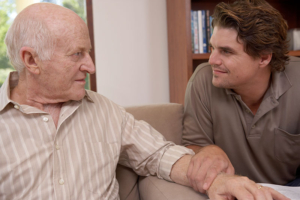 Of the many challenging behaviors typical in Alzheimer’s, possibly the most challenging to manage is aggression. An older adult who may have always been mild-mannered can unexpectedly lash out in outbursts which are truly intimidating: hitting, cursing, kicking, yelling, biting, or throwing things. How can you, as a family care provider, safely diffuse aggression caused by dementia and help reestablish a feeling of calm?
Of the many challenging behaviors typical in Alzheimer’s, possibly the most challenging to manage is aggression. An older adult who may have always been mild-mannered can unexpectedly lash out in outbursts which are truly intimidating: hitting, cursing, kicking, yelling, biting, or throwing things. How can you, as a family care provider, safely diffuse aggression caused by dementia and help reestablish a feeling of calm?
To begin with, remind yourself that the aggression is caused by the disease. It’s not something the individual can control, and it is not intentional. With that being said, it needs to be diffused to keep both you and the senior loved one protected from harm.
“The 6 R’s of Managing Difficult Behavior,” developed by Dr. Peter Rabins and Nancy Mace in their book The 36-Hour Day, could be an effective way to help. Read through and refer back to them so you are equipped for the next burst of aggression.
The 6 R’s
- Restrict. Maintain a calm demeanor and tone of voice as you strive to help the individual disengage from the behavior.
- Reassess. Consider what could have provoked the incident. Causes may include physical pain, an excessive amount of noise or other distractions in the room, hunger, thirst, fatigue, etc. Keeping a journal of what was occurring before and during each incident can help provide clues.
- Reconsider. Empathize with the senior loved one by picturing yourself dealing with a disease that impedes your ability to clearly convey your wishes and needs, to accomplish tasks independently which were once very easy, to feel disoriented and confused, etc.
- Rechannel. Redirect the older adult to an activity the senior enjoys, or relocate to an alternative environment, such as stepping out onto the front porch or going into the dining area together for a snack.
- Reassure. Let the senior know that everything is ok and that you are there. In the event that the person responds favorably to touch, place your hand on their shoulder, offer a pat on the back or hug, or take their hand in yours.
- Review. Make note in your journal what went well – or what didn’t – to assist in utilizing the most effective response when the aggression arises again.
Understanding that aggression may occur at any time in someone with dementia, it’s helpful to assess the home environment and make a plan to make certain it really is as comfortable and calming as possible, such as:
- Playing relaxing music the older adult enjoys in the background.
- Placing familiar, comforting objects within quick access.
- Staying clear of movies that may display violence or other disturbing images.
- Opening the blinds in the day to allow an abundance of natural light to stream in.
Generations at Home is here for you as well with specially trained dementia caregivers who understand the nuances associated with the disease and how to most effectively manage the related challenges. Contact us to learn more about our in-home Alzheimer’s care in St. Petersburg and the surrounding areas.







